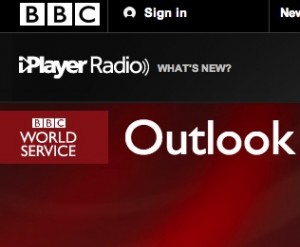 I had a wonderful interview with Matthew Bannister of the BBC recently. His questions were penetrating and well-informed; a man who’d done his homework and was a pleasure to talk with. You can listen to the entire interview here, which follows another discussion with the Sabastiao Salgado, a photographer who captures the human condition with images of epic grandeur. A small sample from the interview which begins about halfway through the recording:
I had a wonderful interview with Matthew Bannister of the BBC recently. His questions were penetrating and well-informed; a man who’d done his homework and was a pleasure to talk with. You can listen to the entire interview here, which follows another discussion with the Sabastiao Salgado, a photographer who captures the human condition with images of epic grandeur. A small sample from the interview which begins about halfway through the recording:
MB: Wasn’t there a time when you didn’t have a necktie?’
Yes, when we arrived in America with the cameras rolling. People noticed that we got off the plane without ties. They asked us, why not? We said we’ve never worn a tie in our lives. So a thousand ties arrived at our apartment. I didn’t speak a word of English but we were on every show. The Today Show, The Ed Sullivan Show. My brother threw the first pitch in the first game of the baseball season.
It must have been an interesting time for you to get to re-know your parents. You must have been strangers in a way.
Certainly we were. We had become men. We had a different kind of relationship. It was warm, emotional but very different. We didn’t talk much about our experiences (in Romania). There was a sense that the past was the past. I have to honor my parents for their courageous decision to refuse to spy against America (in exchange for our freedom). Second, they allowed me to go to boarding school, which was an enormous personal sacrifice. We’d just been re-united but I was sent to a boy’s camp to learn how to speak English. Throughout my life I’ve been blessed by these people I call guardian angels who’ve done extraordinary things for me. The head of Exeter called my father, and said I’ll reserve a seat for your son. My father said but he doesn’t speak a word of English and hasn’t been to school for six or seven years. (Bill Saltonstall) said, “I understand that but he’s learned other things. Bring him here in August and we’ll work something out.”
Did you pass your exams?
Barely, to be honest. I can’t say it was with flying colors. I got six straight zeros in my math exams, until we discovered that I knew how to add and subtract but not how to multiply. (I was in my teens.)
How did you like working for Y&R?
I loved it. I loved the business. It was about caring about consumers. I loved understanding what made people work. Part of the lesson of Romania for me was to try to understand why people do what they do. I learned to trust, like, and respect the customer.
To what extent do you reckon your stint in the labor camp contributed to your rise up the corporate ladder.
It had everything to do with my success, both as a human being and as a professional. I decided I didn’t want to do unto others what was done unto me.
Do you find yourself in flashbacks to your life back then?
Less and less. One of my guardian angels has been my wife. She convinced me to go back to Romania, to forgive and move on with your life. That was cathartic for me.